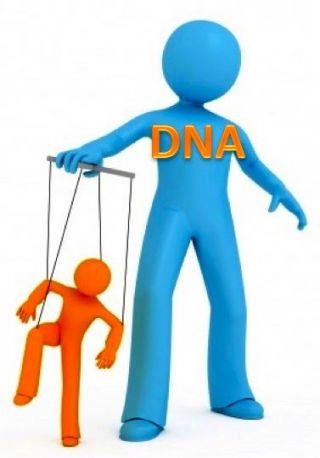Is our DNA controlling our future? How much do our choices affect our bodies?

PBS.org created a documentary highlighting epigenetics, this short clip will be discussed.
The focus of the video is research regarding identical twins. Beginning in Madrid, researchers display two epigenomes: one from young identical twins, and one from elder identical twins. It is clear that the young identical twins have an extremely large amount of overlap of the epigenome, while the elder twins have little overlap. This study demonstrates the effect that individuals' environment has on their gene expression. Over time, twins develop differences within the epigenome based on their decisions, health, and environment. These differences affect their DNA on an epigenetic level, thus some genes are turned on while others off depending on the persons life decisions.
While twins may have the same DNA sequences it is epigenetic tags that regulate the expression thus changing what was originally provided from the parents. Whether or not a gene is expressed can drastically change many aspects of an individual. Over a lifetime the expression or suppression of genes slowly occurs, resulting in differences between twins. This is how epigenetics can effect behaviors. Decisions individuals make will lead to epigenetic changes in their genome that then impact future behaviors and even that of the next generation. These epigenetic differences between twins were what was displayed in the video when viewing the overlapped epigenome, and were the results of the research done in Madrid.
Epigenetics is powerful enough to create distinct differences between identical twins, as well as affect an individuals susceptibility to diseases. The second half of the video is dedicated toward epigenetics role in disease therapy. The study explained that expression or silencing of particular genes through epigenetics plays a role in acquiring diseases, and treating diseases. Previous belief was that cancers occur due to only damaged genes, when in reality epigenetic tags are also at fault. While it is concerning that our choices may lead to epigenetic modifications and those modifications can result in future cancer - this notion of epigenetics is monumental in disease treatment because it is easier to change epigenetic tags than fix a damaged gene.
An epigenetic therapy of various drugs attempts to avoid killing cancer cells (which most cancer treatments do) but rather change the DNA by reactivating genes. The hope is to modify the "instructions" of the cancer cell and change it back toward working as it did before. So far the video states that roughly 50% of patients undergoing epigenetic treatment have gone into remission.
In conclusion, not only does epigenetics effect human behaviors, but it effects behaviors of cells too.
It is clear our decisions greatly impact our epigenome, as presented through the study of twins. How we or the environment impacts our body can affect our life on a phenotypic level, as well as in the epigenome. How one twin behaves may result in gene regulation and their development of a disease that the other twin may not develop. Epigenetics is the key to understanding our behaviors as well as the behavior of cancer cells that were created because of our epigenetic tags.
Reference:
(2009)
PBS.org/nova/sciencenow
https://www.youtube.com/watch?v=wFsxVkuChdU
Pictures all accessed 19/04/2015 and referenced from top to bottom of blog entry:
https://cdn.psychologytoday.com/sites/default/files/styles/article-inline-half/public/blogs/4343/2014/02/144479-146107.jpg?itok=NRdRhVmb
http://carolguze.com/images/Multifactorial/twins/MZ_twins_2.gif
http://www.blogcdn.com/www.parentdish.com/media/2011/05/twins.jpg
http://www.cancervic.org.au/images/CISS/cancer-types/cancer-beginning.gif
To throw a spanner in the works – you say that twins show differences in their epigenomes based on their life choices. However, how much of their life choices are also dictated by their epigenomes, which will naturally differ? How are these researchers activating or deactivating these epigenetic tags? I would imagine that, to target a single gene, this would be quite costly to design a gene-specific trigger.
ReplyDelete